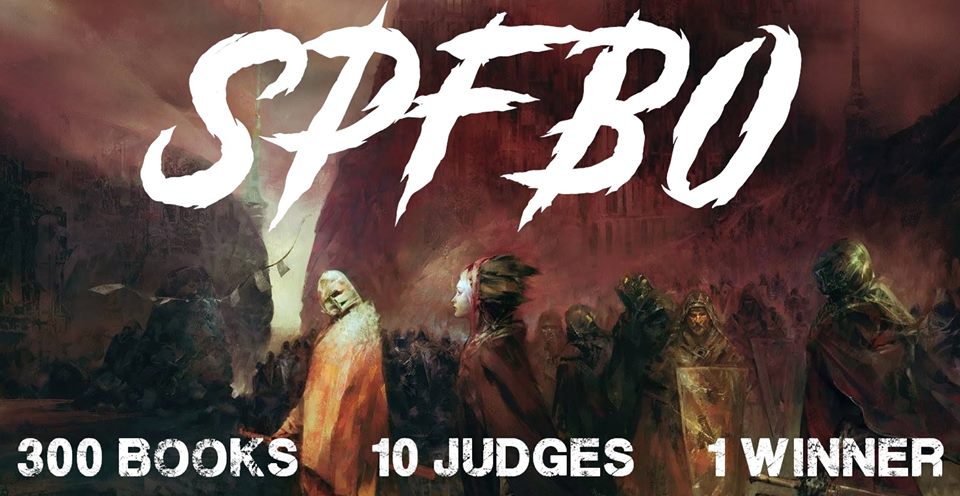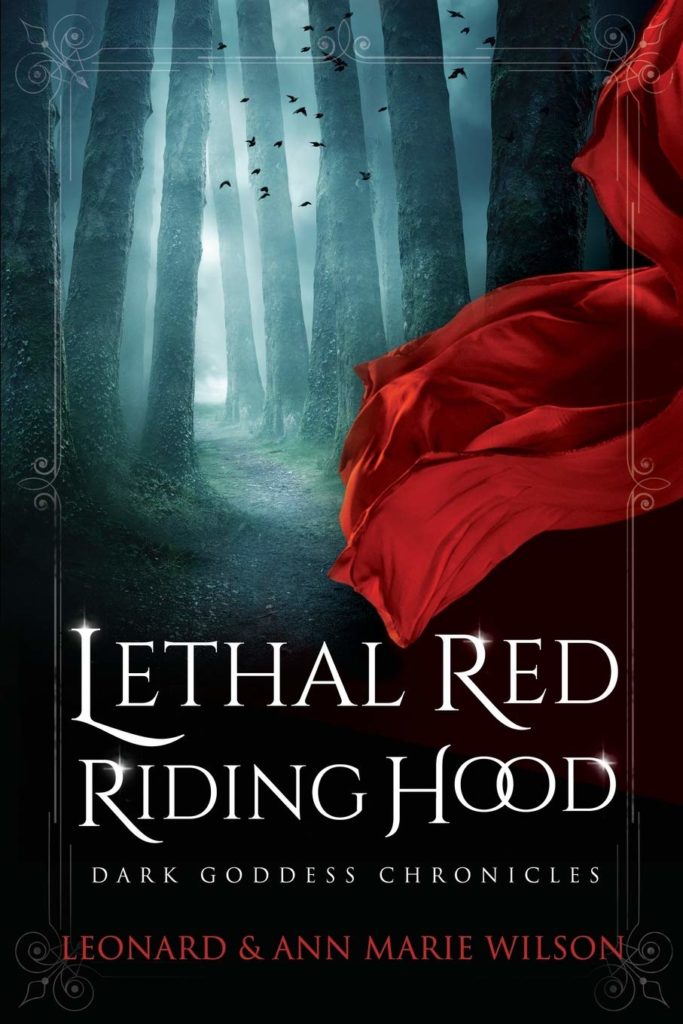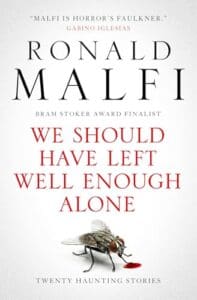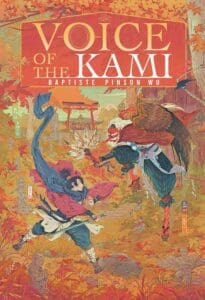
Hello everyone and welcome to our latest guest post for the 7th annual Self Published Fantasy Blog Off! I have been working on reaching out to each of the authors who have landed in our batch of books for the competition to see if they would be interested in being interviewed or contributing a guest article in an attempt to drum up a little extra excitement for their book and (hopefully) get to know them a bit better.
And now, I am excited to share a guest post from the co-authors of Lethal Red Riding Hood, Leonard and Ann Marie Wilson!
If you want to check out the rest of our SPFBO coverage, be sure to check our SPFBO 7 landing page here. On to the article!

It’s easy when the subject of horror stories comes up for our thoughts to focus on a rogues’ gallery of iconic monsters—vampires, werewolves, ghosts, zombies—or on the traditional trappings and atmosphere that pop up on lawns come Halloween.
It’s also easy to get lost in contemplation of the unknown. We naturally fear what might be lurking just out of sight around the corner or in the shadows. We fear the outsider. We fear novelty, with all the uncertainty it brings.
These are all easy and obvious reaches for a storyteller to make. They can be very entertaining for children, very nostalgic for adults, and have resulted in some great stories. The elements often get stirred together in a sort of “horror story as comfort food” recipe. Good stuff—if a bit counterintuitive.
But if you study the real masters of horror—the ones whose names and legacies endure across generations—you’ll find a common thread in their work that has nothing to do with any of this.
Take the case of Edgar Allan Poe and what still stands as one of his most viscerally horrifying works: “The Cask of Amontillado.” If you’re a horror aficionado and you haven’t read it, do. I’m not going to spoil it for you here. Suffice to say, its power doesn’t come from things that go bump in the night.
Take the case of Ray Bradbury. His most memorably chilling tales tended to be about simple domestic scenes gone horribly wrong.
Take the case of Alfred Hitchcock. Of all his body of work, the two images he left most deeply embedded in the American psyche are a hotel shower and a flock of birds. My personal favorite, though, is the very mundane sense of isolation and helplessness he conjured up in Rear Window.
And of course, we can’t forget Stephen King. King’s way into the supernatural elements, and I haven’t completed an exhaustive survey of his work—but I don’t remember him ever neglecting to ground those supernatural elements solidly in the mundane. Turning the ordinary into nightmares is his thing. Whether it’s a scorned schoolgirl, the family dog, an overzealous fan, or a misplaced clown, he takes the things of everyday life and transforms them into horrors you’ll never be able to dislodge from the dark recesses of your brain.
How and why do we find it so visceral and unforgettable when familiar things go bad?
In the tech world they call it the “uncanny valley”. People don’t find robots inherently creepy when they look like robots. But when you take a robot and try to make it look like a person, its appearance will start to freak people out as it edges closer and closer to human. When a thing seems familiar at first glance but then goes on to defy our expectations, it leaves us feeling uncertain, on guard, on edge.
When something we know and trust to the point we take it for granted suddenly goes rogue and tries to eat us, that’s downright terrifying. The storyteller who understands and uses this truth can make the leap from telling a great horror story to telling an unforgettable one. It’s also a truth that inspired the Dark Goddess Chronicles stories I write with Ann Marie Wilson.
We’re not exactly trying to compete with the likes of King or Hitchcock—our goal is simply to tell a rollicking fun story with every tool in our toolbox—but no way are we above learning from the masters. That’s where the fairytale theme comes from. Practically everyone we know grew up steeped in the symbolism of fairy tales. They’re an indelible part of childhood so familiar we take them for granted, which makes them extremely fertile ground for horror stories.
It’s the symbolism specifically that we’re going for too, not the stories themselves. There are lots of dark, “mature”, and/or humorous re-imaginings of the classic fairy tales out there already. We’re more stripping Grimm’s Fairy Tales down for parts and reassembling them into our own Frankenstein’s monster.
(Note from the Editor: the authors would like me to mention that October 26th – November 2nd, the Kindle-edition price for Lethal Red Riding Hood on Amazon will be reduced from $6.99 to $4.99. Get it while it’s hot, folks!)
About the Author(s)
Leonard & Ann Marie Wilson met when she showed up on his doorstep where they quickly bonded over nearly everything, including their shared love of writing. Two years later they were married and collaborating on nearly everything.
Leonard came to storytelling first through Dungeons & Dragons, then on to other role-playing games. Immediately after earning a degree in writing, he began freelancing, writing adventures for the RPG industry. While he was never a prolific author, the internet still seems to regard a couple of his works as classics of their type (“The Ghost of Mistmoor” in Dungeon magazine, and “The Heart Blade” in Pendragon’s Blood and Lust adventure anthology). Coincidentally, those same two adventures are what paid for their wedding rings and honeymoon.
Ann was a gamer girl in her own right when they met, and she retains an “old school” pedigree longer than anyone who’s ever accused her of being a poser. She wrote stories for fun, but thanks to the careless words of a particularly unfortunate English teacher, never got around to pursuing her ambitions of publishing before she met Leonard. That didn’t stop her from finishing her first novel-length manuscript before he finished his.
They launched their own imprint, Lost in the Wood Press, just in time to have it as a steady project to ride out the COVID lockdown, and are loving the complete creative freedom that comes with self-publishing.
Author Links
Facebook: https://www.facebook.com/LeonardAnnMarieWilson/
Instagram: https://www.instagram.com/amwilsonwriter/
Twitter: https://twitter.com/amwilsonwriter
Author Website: http://lostinthewood.net/
Amazon: https://www.amazon.com/dp/B08L73T4RW/ref=cm_sw_r_tw_dp_DWBYS8XD4VHY8W1G76WS?_encoding=UTF8&psc=1
Publisher Links
Facebook: https://www.facebook.com/LostInTheWoodPress/
Instagram: https://www.instagram.com/lostinthewoodpress/
Youtube: https://www.youtube.com/channel/UCdYyQghAzW_U_mBkJZSTv9Q
Website: http://lostinthewoodpress.com/






Leave a Reply